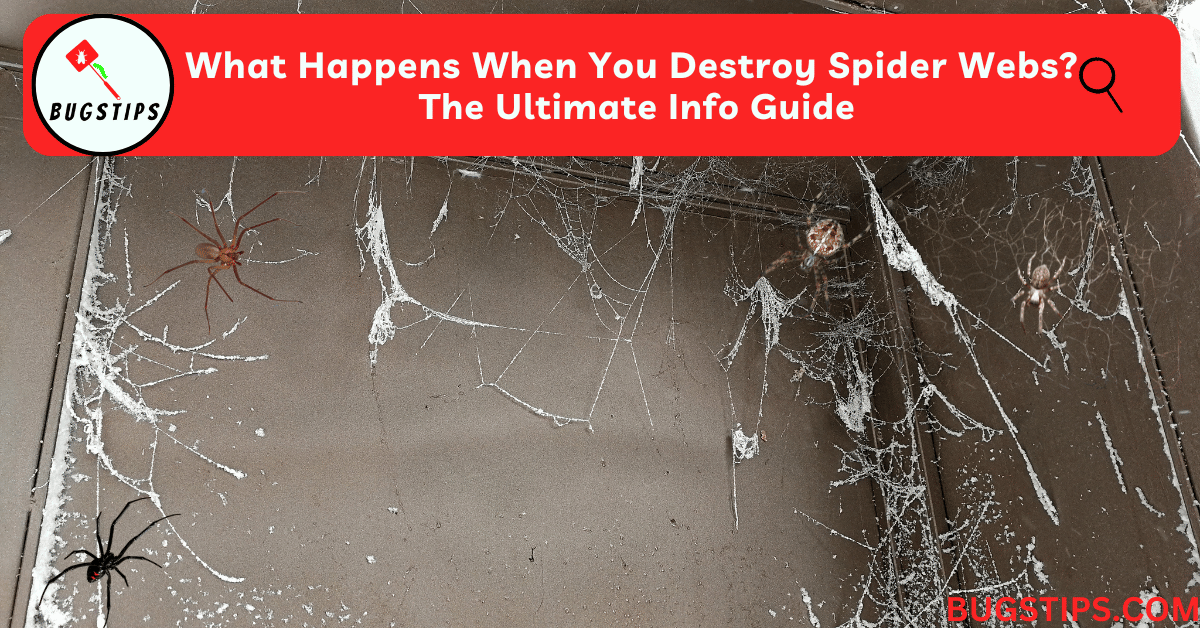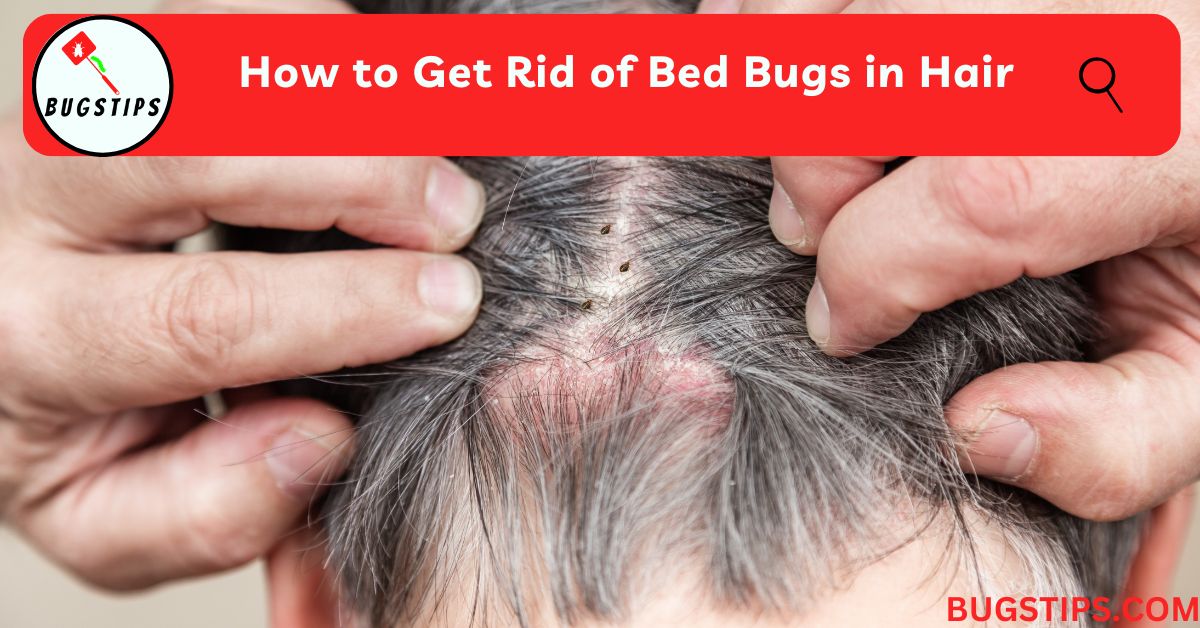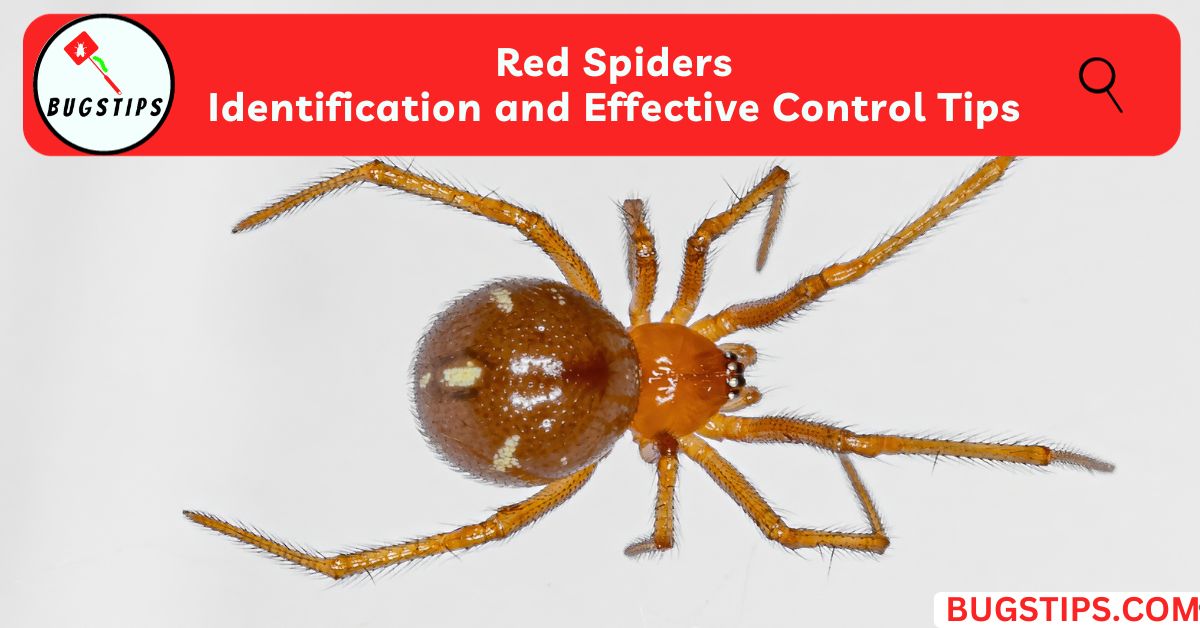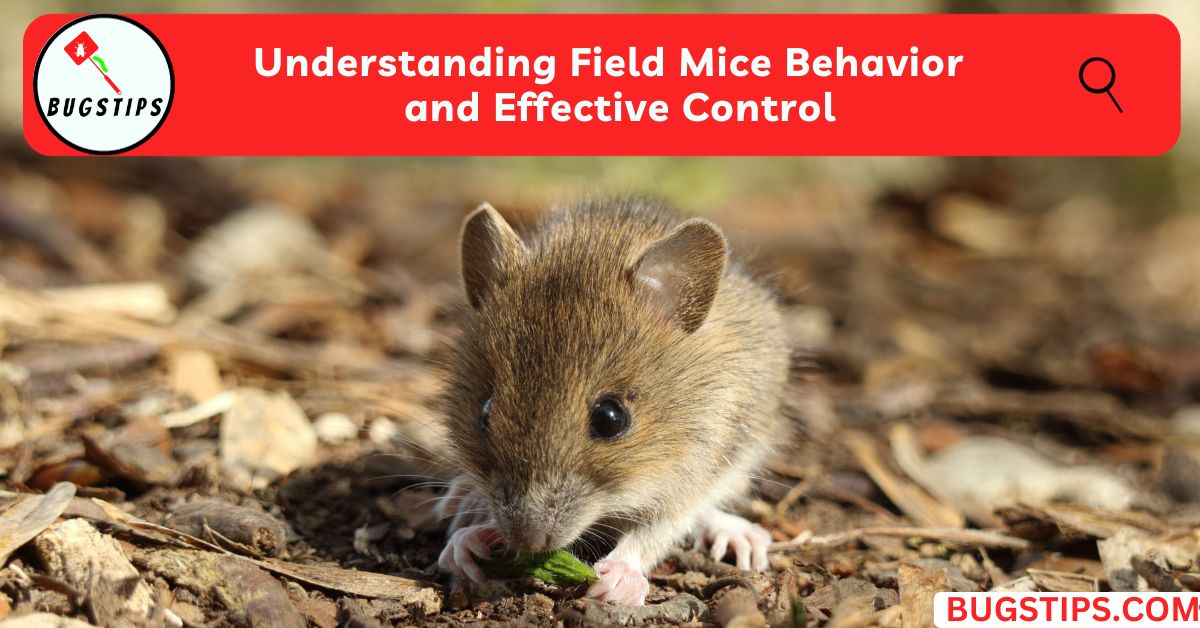This post may contain affiliate links which means as an Amazon Associate, this site may earn a small commission on qualified purchases made through links at no extra cost to you. Learn more on Affiliate Disclosure
Have you ever come across a spider web in your house or backyard and felt the urge to destroy it? While spider webs may seem like a nuisance to some, they actually serve an important purpose in the ecosystem.
So, what happens when you destroy spider webs? In this article, we’ll dive into the consequences of destroying spider webs and explore the impact it can have on spiders and their environment.
Plus, we’ll give you some tips on how to safely and permanently remove spider webs from your home. So, if you’re wondering whether you should destroy spider webs, keep reading to find out.
The Importance of Spider Webs
Before we delve into the effects of destroying spider webs, let’s first understand the importance of spider webs. Spider webs are not just a pretty sight in nature. They actually serve an important purpose in the ecosystem.
Here are a few reasons why spider webs are crucial for our ecosystem:
Spider webs are used by spiders to catch insects for food and to protect themselves from predators. In fact, spiders are one of the primary predators of insects and play a crucial role in controlling insect populations.
But spider webs are not just beneficial for spiders. They also help to maintain a healthy balance in the ecosystem.
When insects are caught in spider webs, they are removed from the environment, preventing them from causing damage to crops and other plants. This, in turn, helps to support a healthy and sustainable ecosystem.
Additionally, spider webs have been studied for their unique properties, which have inspired researchers to develop new materials such as strong and flexible fibers for clothing and other applications.
So, next time you come across a spider web, remember its importance in the ecosystem and its potential for inspiring new innovations in the future.
Should You Destroy Spider Webs?
Spider webs can sometimes be a nuisance, especially when they are inside your home or in areas where you frequent them.
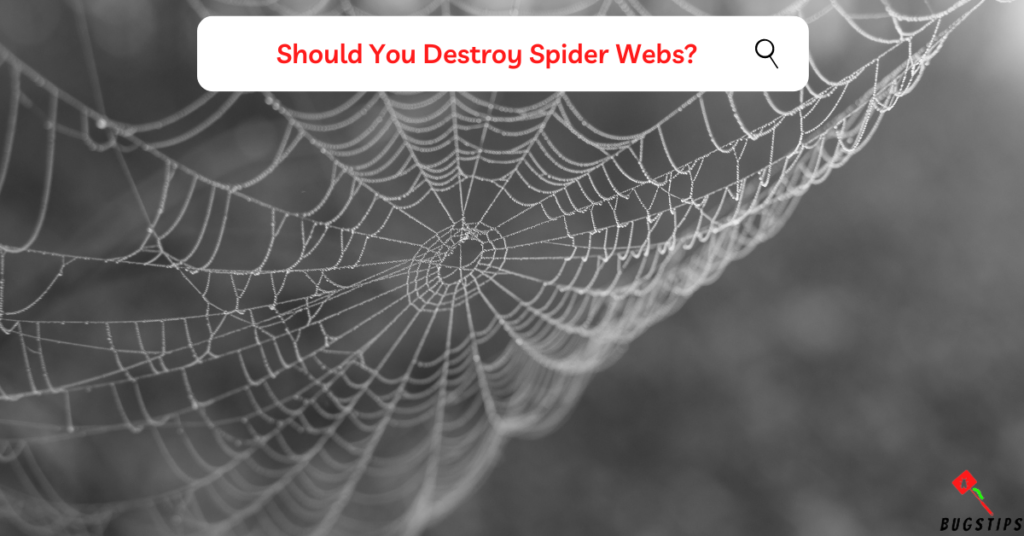
But before you take out that broom and start sweeping away, it’s important to consider whether or not you should destroy spider webs.
First of all, remember that spiders are a natural part of the ecosystem and play an important role in controlling insect populations. By removing spider webs, you could be inadvertently causing an imbalance in the ecosystem and allowing insects to thrive unchecked.
Moreover, spiders are generally harmless to humans and do not pose a significant threat. Unless you have a severe allergy or a specific phobia of spiders, there is usually no need to destroy their webs.
That being said, there are situations where destroying spider webs may be necessary. For instance, if a spider web is blocking a path or a doorway, it may be best to remove it to prevent accidents.
Similarly, if spider webs are causing an infestation inside your home, you may need to take steps to control the spider population and remove their webs.
You’ll Also Like – Spiders in Car: How to Get Spiders Out of Your Car
So it's generally best to leave spider webs alone and let spiders do their job in the ecosystem. However, there are times when it may be necessary to remove their webs, so use your judgment and consider the situation carefully before taking action.
What Happens When You Destroy Spider Webs?
If you’ve decided to destroy spider webs in your home, whether due to an infestation or simply not wanting them around, you may be wondering what happens when you remove them.
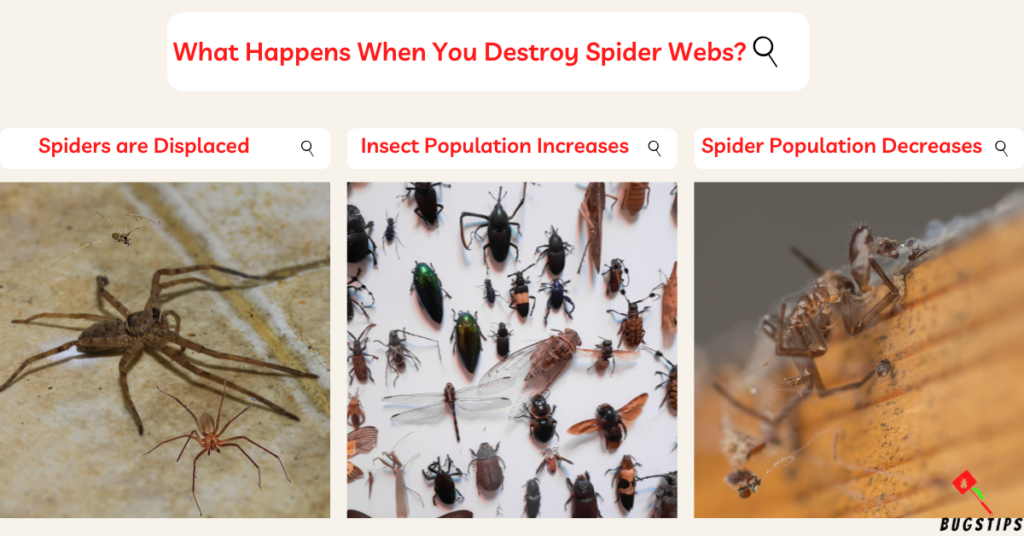
While it may seem like a harmless act, destroying spider webs can actually have significant impacts on both the spider and insect populations, as well as the overall ecosystem.
Spiders are Displaced
When spider webs are destroyed, spiders are displaced and forced to find new areas to spin their webs.
This can be particularly difficult for spiders that have established territories and may have difficulty finding new sources of food and shelter.
Additionally, spiders may become stressed and disoriented when their webs are destroyed, which can have negative effects on their health and well-being.
In some cases, the spider may not find a suitable location and may die as a result.
Insect Population Increases
Without spider webs to trap and catch insects, the insect population can increase rapidly.
This can lead to a variety of issues, including increased pest activity and potential damage to crops and other vegetation.
Spiders play an important role in keeping insect populations in check, and without them, the ecosystem can become unbalanced.
Spider Population Decreases
If you continuously destroy spider webs, it can lead to a decline in the spider population.
Spiders have a limited lifespan, and they need to reproduce to ensure the survival of their species.
If you remove their webs, they may not be able to reproduce, which can lead to a decline in their population.
Negative Effects on the Ecosystem
As we mentioned earlier, spiders play a vital role in the ecosystem. When you destroy their webs, it can have a ripple effect on the ecosystem.
For example, if there are fewer spiders to control the insect population, it can lead to a decrease in the bird population, as birds rely on insects as a food source. This can disrupt the food chain and lead to a decrease in biodiversity.
Related Article – How to Get Rid of Spiders Under Eaves
What Do Spiders Do When You Destroy Their Web?
When you destroy a spider’s web, the spider will most likely try to rebuild it. Spiders use their webs to catch prey, and without a web, they won’t have a reliable source of food. So, the spider will need to create a new web as soon as possible.
In some cases, the spider may abandon the area altogether and look for a new location to build a web. This is especially true if the spider senses that the environment is no longer suitable for it to thrive.
However, it's important to note that spiders don't have emotions like humans, so they won't feel upset or angry if their web is destroyed. They simply react to their surroundings and try to adapt to the situation.
So, if you do accidentally destroy a spider’s web, don’t worry too much about the spider’s feelings. It will simply do what it needs to do to survive and thrive.
How Long Do Spiders Keep Their Webs?
Spiders use their webs to catch prey and also as their home. So how long do they keep their webs before making a new one?
The answer depends on the spider species and environmental factors. Some spiders may keep their webs for weeks or even months, while others may abandon their webs and rebuild a new one every day.
For example, orb-weaving spiders are known to rebuild their webs every night. This is because their webs are designed to catch flying insects, and the webs can become damaged or lose their stickiness after exposure to the elements and prey.
On the other hand, house spiders may keep their webs for several months, as they are typically found in more stable environments indoors where the web is less likely to become damaged or lose its stickiness.
It’s also worth noting that some spider species are nomadic and don’t build webs at all. These spiders move around and hunt for their prey instead of waiting for it to come to them in a web.
You’ll Also Like – Can a Spider Die from Falling
So, how long a spider keeps its web varies depending on the species and environmental factors, such as the location of the web and the type of prey it catches.
Do Spiders Get Stuck in Their Own Web?
Spiders are masters of spinning webs, but that doesn’t mean they’re immune to getting caught in them.
Yes, spiders can get stuck in their own webs. In fact, it happens quite frequently.
However, spiders have adapted to this potential hazard. They have tiny hairs on their legs that prevent them from getting entangled in the sticky strands of their webs. Additionally, some spiders are able to walk on their tippy-toes, avoiding contact with the sticky silk.
But even with these adaptations, spiders can still get caught in their webs, especially if they’re in a hurry or trying to move quickly.
When this happens, they use their legs to free themselves by carefully detaching the silk from their bodies. They’ll also use their fangs to bite and cut the silk if necessary.
It’s important to note that not all spider webs are sticky. Some spiders create webs that are more like hammocks or tents, with only a few sticky strands to catch prey.
In these types of webs, it’s less likely for spiders to get caught in their own trap.
Overall, while spiders can get stuck in their own webs, they have evolved to avoid this as much as possible. And if they do get trapped, they have adapted techniques to free themselves and continue their daily routine of catching prey and building webs.
What Are the Weaknesses of Spider Webs?
Spider webs are impressive structures that have been refined over millions of years of evolution to serve the needs of the spider. However, despite their strength and resilience, spider webs do have weaknesses.
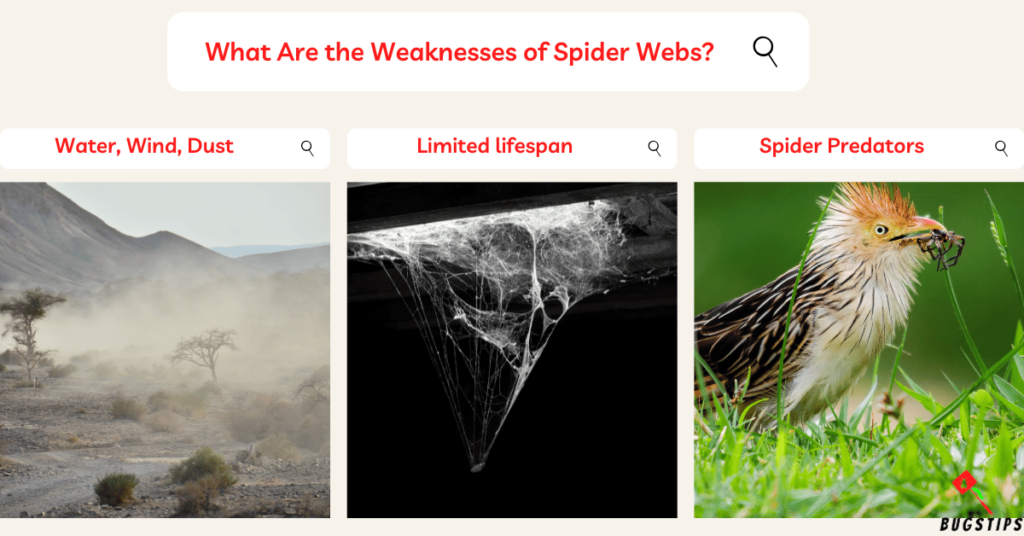
Water, Wind, Dust
One of the primary weaknesses of spider webs is their susceptibility to damage from wind, rain, and other environmental factors.
A strong gust of wind or heavy rainfall can easily tear a web apart or cause it to become dislodged from its anchor points.
Limited lifespan
Another weakness of spider webs is their limited lifespan. Most spider webs are not designed to last for more than a few days or weeks at most.
This means that spiders must constantly rebuild their webs to ensure that they have a reliable source of food.
And, the sticky strands that make up spider webs can become clogged with debris over time, reducing their effectiveness at catching prey.
Spider Predators
Spider webs can be a double-edged sword for spiders. While they provide an effective means of catching prey, they can also attract predators, such as wasps and birds, who see the spider as an easy target.
In some cases, spiders may even become trapped in their own webs, particularly if they are not careful when navigating through them.
Despite these weaknesses, spider webs remain incredibly effective structures for catching prey and are an important part of many ecosystems. As such, it is important to handle them with care and to avoid damaging them whenever possible.
Do Spiders Leave Their Webs and Come Back?
Yes, spiders can leave their webs and come back to them. Spiders use their webs to catch prey, and they need to be present to hunt and consume the trapped insects.
However, they may also leave their webs for other reasons, such as to find a mate, escape predators, or seek shelter.
When a spider leaves its web, it does not abandon it completely. Instead, the spider may leave a few strands of silk attached to nearby objects as a way to find its way back.
Spiders also have a good sense of direction and can navigate their surroundings using visual cues and other senses.
In some cases, spiders may build multiple webs in different locations and move between them as needed.
For example, a spider may build a web in a sunny spot during the day and move to a cooler, shadier location at night.
Some spiders, like orb-weavers, build new webs every day and consume their old webs for nutrients.
You’ll Also Like – Spider Under Toilet Seat?
So overall, spiders are adaptable creatures and can adjust their behavior to changing circumstances. While they may leave their webs from time to time, they always return to continue their hunt for prey.
Do Spiders Leave Their Webs at Night?
Spiders are primarily nocturnal creatures, meaning they are most active at night. As such, it’s not uncommon for spiders to leave their webs at night to go hunting for food or to mate.
However, not all spiders leave their webs at night. Some species, such as orb-weavers, stay in their webs around the clock and wait for prey to come to them.
As mentioned above the behavior of spiders leaving their webs at night also depends on various factors, such as their habitat, food availability, and weather conditions.
For example, in areas with high insect populations, spiders may not need to leave their webs at night as there is plenty of food available. Conversely, in areas with low insect populations, spiders may need to leave their webs at night to hunt for food.
Can a Spider Web Stop a Human?
While spider webs are known for being incredibly strong for their size, they are not strong enough to stop a human. In fact, spider webs are not designed to stop large animals or humans, but rather to catch insects and other small prey.
While it’s true that walking through a spider web can be an unpleasant experience, it’s unlikely to stop a person in their tracks.
Most spider webs are made of thin strands of silk, and while they may stick to a person’s skin or clothing, they can easily be brushed off.
However, there are some exceptions. Some species of spiders, such as the golden orb-weaver spider, are known for building much larger webs that are strong enough to catch larger prey, including birds and bats.
These webs can be much more difficult to break through, and a person could potentially become tangled in them if they were walking through a forest or other area where these spiders are found.
In addition, there are some spiders, such as the black widow, that are known for building webs in low-traffic areas where they are less likely to be disturbed.
These webs can be difficult to see and a person may accidentally walk through them, potentially coming into contact with the spider itself.
While these spiders are generally not aggressive toward humans, their bites can be dangerous and should be treated promptly.
Related Article – How to Trap Spiders at Home
So, while spider webs are impressive feats of engineering and incredibly strong for their size, they are not designed to stop humans and are generally not a threat to people.
How Do I Permanently Remove Spider Webs from My House?
While this article is primarily focused on providing information and facts about spider webs and what happens when you destroy them, we understand that many people want to know how to permanently remove spider webs from their homes.
If you’re one of them, don’t worry, we’ve got you covered. In addition to the tips we’ll give you here, you can also check out our in-depth guides on how to get rid of spiders in your home.
Related Article – How to Trap Spiders at Home: Only Guide You Need
Identify where spiders are
The first step in removing spider webs from your house is to identify where they are. Look for webs in areas where spiders are likely to live, such as corners, ceilings, and dark spaces.
Use a broom or vacuum cleaner
Once you’ve located the webs, use a broom or vacuum cleaner to remove them. Be sure to wear gloves and long sleeves to protect yourself from any spiders that may be hiding in the webs.
Keep your house clean
Next, you’ll want to eliminate any sources of food or water that may be attracting spiders to your home.
This means keeping your house clean and free of crumbs and other food debris. It also means fixing any leaky pipes or faucets that may be providing water for spiders.
Use natural spider repellents
Another effective way to get rid of spiders is to use natural spider repellents. Peppermint oil, vinegar, and citrus sprays are all effective at repelling spiders.
You can also plant spider-repelling plants, such as lavender or eucalyptus, around your home.
Hire a professional exterminator
If you have a serious spider infestation, you may want to consider hiring a professional exterminator.
They can use specialized tools and chemicals to get rid of spiders and prevent them from coming back.
while spider webs can be fascinating to observe, many people want to get rid of them in their homes. By following these tips and taking preventative measures, you can permanently remove spider webs from your house and prevent spiders from returning.
Final Thoughts
Spider webs serve an important purpose in the ecosystem, and destroying them can have unintended consequences. However, if spider webs are causing a nuisance in your home, there are ways to safely remove them.
Remember, spiders are beneficial creatures that can help control other pests in your home. So, before resorting to destroying their webs, consider other options for spider management. But if you must, make sure to do it safely to avoid harming the spider or damaging your property.
We hope this in-depth guide has answered all your questions regarding spider webs and what happens when you destroy them.
FAQs
What is the purpose of a spider web?
The purpose of a spider web is to catch prey, protect the spider’s eggs, and provide a place for the spider to live.
Does a spider really spin a new web every day?
It depends on the species of spider. Some spiders may spin a new web every day while others may use the same web for several days or even weeks.
Should I destroy a spider web?
If the spider web is in an inconvenient location or poses a safety risk, it may be necessary to remove it. However, it is important to remember that spiders play an important role in controlling insect populations and their webs should not be destroyed without a good reason.
Do spiders get upset when you destroy their webs?
Spiders do not have emotions as humans do, so they cannot experience emotions such as being upset. However, they may sense that their web has been destroyed and may react by spinning a new one.
Will a spider die if its web is destroyed?
No, spiders will not die if their web is destroyed. They are able to survive without a web and will simply spin a new one if necessary.
Do spiders die after spinning a web?
No, spiders do not die after spinning a web. Spinning a web is just one of the many tasks that spiders perform as part of their daily routine.
How long does a spider web last?
The lifespan of a spider web depends on various factors such as the species of spider, weather conditions, and the amount of traffic the web receives. Some spider webs may last for several weeks while others may only last for a few days.
Why don’t spiders stick to their own web?
Spiders are able to move around their own webs without getting stuck because they have special hairs on their legs that prevent them from getting caught.
Is spider web sperm?
No, the spider web is not sperm. Spider silk is produced in silk glands and is used to create spider webs. Sperm is produced by male spiders and is used to fertilize the eggs of female spiders.
Resources – (for further reading)
Science Daily – Researchers document every step of spider-web building
Encyclopedia Britannica – Orb weaver | spider , Spider – Spider webs and classification
Mo.gov – Common House Spider

